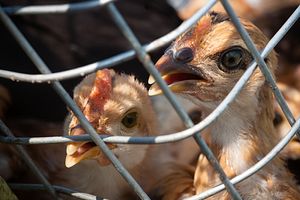Hong Kong’s Center for Health Protection announced that 17 people have been put in isolation, with an additional 200 under observation, after the city’s first human case of H7N9 avian flu was confirmed yesterday. Doctors said that a domestic worker from Indonesia most likely contracted the virus during a recent trip to the mainland.
“[She] had recently traveled to Shenzhen … where she bought, slaughtered, and ate a chicken,” Hong Kong’s secretary for food and health, Ko Wing-man, told CNN. “Hong Kong [has] raised its level of preparedness for an influenza pandemic to ‘serious.’”
The increased alert level puts several policies into effect, namely the suspension of chicken imports from Shenzhen. The food and health bureau will also ramp up monitoring activities designed to limit the potential for H7N9 to spread.
Though there are no confirmed cases of human-to-human transmission, the Center for Health Protection selected the 17 individuals for quarantine based on their close proximity to the Indonesian maid. They include members of the family that employed her, people who shared a cubicle with her at the hospital, and an Indonesian friend who had accompanied her to Shenzhen.
“There is so far no evidence to show the virus has spread to another person,” said Dr. Leung Ting-hung, the Center’s leader. He added that, of the 17 classified as high-risk, 11 had already tested negative for infection.
Indonesia’s Consulate General in Hong Kong (KJRI) confirmed the identity of the infected migrant worker as Tri Mawarti, age 36. She was initially taken to Tuen Mun Hospital on November 27, and has since been moved to Queen Mary Hospital. Her condition remains critical.
“[We] will continue to monitor the development of the case and will seek all the support she needs, including to bring her family to Hong Kong,” read a release from the consulate general.
According to the World Health Organization, there have been 139 confirmed cases of human H7N9 that have led to 45 deaths. People infected with this strain of bird flu generally start off with a high fever and coughing that can turn into severe pneumonia, acute respiratory distress syndrome (ARDS), septic shock, and organ failure.
H7N9, which is more deadly than the previous H5N1 avian flu strain, emerged in Shanghai last February. The elderly face the highest risk, with children under five years old also under increased danger.

































